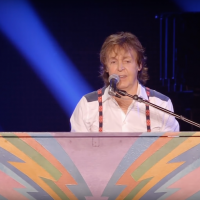Amid a dizzying number of appearances on TV talk shows and several live performances, Paul McCartney finally releases his anticipated album New. His first collection of original material since 2008’s excellent Fireman project Electric Arguments, New finds McCartney in an experimental yet reflective mood. Working with four different producers, he ranges from introspective to joyful, incorporating some electronic elements to update his sound. In general, New stands as McCartney’s mantra, namely that he has no intention of slowing down or softening his current predilection toward hard rocking material.
While the title track was chosen as the first single, several other songs outshine the tune in depth and originality. “On My Way to Work,” produced by George Martin’s son Giles, exemplifies Paul McCartney’s strength in storytelling. The mid-tempo track features McCartney narrating a day in the life of a regular working man; as he rides the bus, he observes passengers “smoking cigarettes; I picked the packets up when the people left.” He amusingly describes reading a British tabloid, eying a naked centerfold: “she had removed her clothes for the likes of me,” he flatly describes. As he arrives at work, he reflects on his mundane existence: “How could I have so many dreams, and one of them not come true?” he asks.
Another outstanding song, “Early Days” finds McCartney reflecting on his friendship with John Lennon. Accompanied by a single acoustic guitar, he recalls their early years as struggling musicians in Liverpool. “So many times I had to change the pain to laughter,” he muses. The lyrics paint a vivid picture of the two teenagers: “Dressed in black from head to toe, two guitars across our backs. We would walk the city roads, seeking someone who would listen to the music,” he sings. Interestingly he responds to unnamed critics (perhaps some Beatles authors who have published dubiously researched books) by declaring “Now everybody seems to have their own opinion, who did this and who did that. But as for me I don’t see how they can remember, when they weren’t where it was at,” he argues. “And they can’t take it from me if they try.” As McCartney issues this definitive argument, producer Ethan Johns (son of Glyn Johns) wisely keeps the arrangement minimal, letting Paul McCartney’s time-weathered voice take center stage in this tender ballad.
New also finds time for upbeat rockers such as the Wings-eque “Save Us,” helmed by producer Paul Epworth. McCartney’s rapid-fire guitar playing drives the beat, showing no sign of his 71 years of age. “Queenie Eye” also soars, Epworth’s pounding drums complementing the fuzzy bass woven throughout the track. In the liner notes, McCartney explains that the phrase “queenie eye” derives from a Liverpool street game; the chanting chorus emulates the sing-song quality of a childlike song but the edgy sound rescues the song from becoming too cloying.
In some cases, the music somewhat exceeds the lyrics. In the Martin-produced “Appreciate,” the grunge-meets-electronica sound effectively updates Paul McCartney’s classic rock tendencies without overshadowing them. The lyrics, however, smack of self-help mantras such as “In the middle of a crisis; you must appreciate the day. … Give back, reciprocate her love.” Band members Rusty Anderson, Brian Ray, and Abe Laboriel, Jr. guest on the track, inspiring McCartney to push his voice slightly harder. “Everybody Out There” also falls into the trap of overused sentiments like “Hey, do what you want to make a difference. … There but for the grace of God go I; we’re the brightest objects in the sky.” The exotic drum and guitar breaks, however, add an extra element to the track. As he screams “out there!” at the end, a la Kurt Cobain on “Smells Like Teen Spirit,” one senses how his sessions with Nirvana founders Dave Grohl and Krist Novoselic may have influenced his own music.
Another notable producer, Mark Ronson, worked on two New tracks: the title song and “Alligator,” another Wings-influenced number. Using a zoo metaphor, Paul McCartney calls for someone to save him from himself. In a rare instance of revealing his personal demons, he sings “I want someone who can bail me when I get up to my tricks. I need somebody used to dealing with a sinner.” He asks “Could you be that person for me? Would you feel right setting me free? Could you dare to find my key?” In this and other tracks such as “Hosanna” and “Road,” he may be referring to his relationships, namely the breakup of his marriage to Heather Mills and his romance with current wife Nancy Shevell. In the aforementioned songs, he portrays Shevell as a savior who pulled him through a difficult time.
While not on a par with Band on the Run, Tug of War, or Flaming Pie, New intrigues in that it presents a different side of McCartney in theme and sounds. It’s the story of a survivor and warrior who shows no signs of retreat or any inclinations toward retirement. The four producers update his music without alienating longtime fans (listen for a few Beatles references in such tracks as “Queenie Eye”). Overall, New offers a snapshot of Paul McCartney’s life today, covering both happiness and heartbreak, and showing a willingness to venture out of his musical comfort zone. For those reasons, New serves as a perfect title and summation of the latest addition to his vast catalog.
- How John Lennon Came Roaring Back on the Beatles’ White Album - November 22, 2023
- Five ‘With the Beatles’ Deep Cuts That Illustrate Their Lasting Debt to R&B - November 20, 2023
- Five Must-Hear Deep Cuts from the Beatles’ ‘Past Masters’ - March 7, 2023



